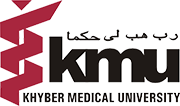KMU and PICO Signs MoU for collaboration in Eye Health Research, Teaching and Learning
The Khyber Medical University (KMU), Peshawar and Pakistan Institute of Community Ophthalmology (PICO) Hayatabad Medical Complex, Peshawar signed a memorandum of understanding (MoU) to combine excellence in research, teaching and learning in all undergraduate and postgraduate study programs including MPH Community Eye Health, MPhil vision sciences, bachelor of vision sciences and ophthalmic technicians. The MoU was signed by vice chancellor KMU Prof. Dr. Zia ul Haq and director PICO Prof. Dr. Sanaullah Jan, whereas Registrar KMU Prof. Dr. Saleem Gandapur, director KMU-IPH&SS Dr. Saima Afaq and Dy. director academics PICO Dr. Sidiq ullah were also present at the occasion.
The MoU stated that both KMU and PICO will be responsible for contributing in terms of human resources for the selected programs offered by KMU and PICO. The programs will be jointly offered by both KMU and PICO including MPH in Community Ophthalmology and MPH general. KMU and PICO will receive 50 % shares of tuition fee for all the approved number of students. PICO will be responsible for arranging clinical training in HMC and PICO. Admission process, students’ induction, time table management, clinical rotation and conduction of examination will be the responsibility of KMU. PICO will provide infrastructure facilities including furnished classrooms, computer lab, library and skill lab facilities to students.
The MoU said that KMU will help PICO faculty by providing PhD scholarships to fulfill the requirements for future development of the institute at national and international level for all the courses. PICO and KMU will share the remuneration of visiting faculty; KMU will be responsible for 75% of the faculty and the rest 25 % will be paid by PICO.
The aim of the MoU is to reduce the prevalence of blindness and visual impairment and to improve the quality of life of people with blindness, visual impairment and other eye ailments through human resource development for comprehensive eye care, to conduct clinical, epidemiological and social research on the burden of blindness & visual impairment, its social and economic consequences, identifying risk factors and barriers faced by people in availing eye care services in order to improve eye care services delivery in underprivileged areas, to extend comprehensive eye care services to district and sub-district levels so that they become available, accessible, acceptable and affordable to all segments of population, to plan capacity building of eye care teams at national, provincial, district and sub-district levels in the management of eye care programs making eye care services more effective and efficient.


